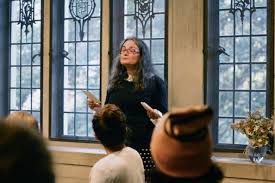The Wellesley College Russian department hosted acclaimed Russian poet, Vera Pavlova, for “A Night of Music and Poetry.” Throughout the night, she not only played Tchaikovsky’s Children’s Album — a thirty-minute cycle of twenty-four songs for piano about childhood — but added to the song cycle an element of poetry, reciting twenty-four poems from her book of seventy-four poems about childhood: Album for the Young (and Old): Poems.
Between or during each piece she played, she recited her poetry, all of which she wrote one summer after being inspired by Children’s Album. The poems are primarily written to reflect a child’s perspective of the world. The poems ranged from the comical to the serious to what we often consider the boring minutiae of daily life, livened through the perspective of a child. As she played and spoke, carefully selected photographs from family albums and childhood drawings from her daughter, Lisa, were projected. The images were so carefully curated that an audience member asked Pavlova after the performance if she had written the poems based on the images and the drawings. Pavlova said she had written the poetry based on Children’s Album and her daughter Lisa had selected the images to line up with the poems afterward.
One of the things I appreciated most about the recital was that the piano and the photographs did not feel like backdrops for the poetry. For Pavlova, the poetry, the music and the images were complements, intertwining with each other to create a touching, poignant recital. In a short question and answer section following the recital, Professor Alla Epsteyn from the Russian department, asked the audience for their reactions. A few audience members who had family in Russia or in Eastern Europe mentioned shared experiences with Pavlova’s account, but what struck me even more was how even those of us with no Russian heritage could relate to her poetry and music as the essence of childhood that she captured transcended national and ethnic boundaries.
The recital really made me regret that my primary exposure to the Russian language has been through 80’s Bond villains. What Pavlova recited sounded lyrical to my ears, and the English translation of the poetry on the projector was beautiful. My only real complaint with the recital was that the English translation was not up for long enough to really process the words, especially when the poetry was clearly intricate and filled with meaning.
Professor Thomas Hodge from the Russian department explained the Russian language aspect of her poetry, saying, “Pavlova has a prodigious gift for orchestrating complex, witty combinations of sounds — her rhymes are always clever and unexpected, and she displays everything from puns to near-anagrams to brilliant examples of assonance and internal rhyme.” He continued, “She is a playful, ingenious, acutely sensitive poet who puts her formidable intelligence to work expressing women’s experience of the world. And in the case of the Children’s Album poems, ‘the world’ is the intimate circle of Soviet family life in the 1970s, fondly recalled by a girl-daughter-mother-poet.”
Overall, Pavlova’s powerful words and stories resonated with the audience, whether they were students studying in the Russian Department, casual readers of Russian literature or students who were hearing Pavlova’s words for the first time.



